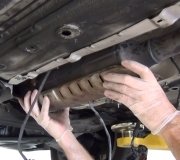Lots of cars have engines that are burning oil and that doesn't damage the catalytic converters. Their job is to store oxygen to mix with unburned hydrocarbons so it can be burned completely.
Regardless, once the Check Engine light turned on, you apparently had someone read the diagnostic fault code. Those codes never say to replace parts or that they're defective. They only indicate the circuit or system that needs further diagnosis. There are over a dozen potential fault codes related to catalytic converter performance. First you have to know the exact code number, then there will be a long list of steps to follow to narrow down the cause of that code. The part referenced in the code, the catalytic converter in this case, will actually need to be replaced probably half of the time. Don't assume you need a converter until the problem is fully diagnosed.
The performance of the converters is monitored on '96 and newer models by a second oxygen sensor. The front one will switch between "too rich" and too lean" about two times per second. If the converter is doing its job, the second oxygen sensor will switch between rich and lean perhaps once per minute. As the converter loses its efficiency, less and less change takes place in the exhaust gas between entering and exiting, and the switching rate of the second sensor speeds up until it eventually matches that of the front sensor. The frequency of those switching rates is what the Engine Computer watches. There is a threshold, or predetermined switching rate at which the fault code is triggered and the Check Engine light turns on. Once the switching rate of the second sensor begins to increase in response to an imminent failure, it can takes weeks or months before that threshold is reached and exceeded. Often it's just a miserable coincidence that when that happens, the mechanic is working on the car for some other problem, or a friend borrowed the car, or some other event happened at the same time. That's how the wrong people or the wrong circumstances get blamed. That's what your mechanic meant by "it probably was bad before the repair was made". He could have explained it better, but unfortunately, like people in a lot of other professions, most mechanics don't have real good communication skills except when they're talking with other mechanics.
I suppose it's possible burning excessive oil over a period of time could have hastened the inevitable failure but I doubt it would be the sole cause. Catalytic converters fail all the time and we would never know it if the Engine Computer didn't tell us. A lot of major engine work results in oil or coolant running into the exhaust system where it is burned off when the repaired engine is started. That can result in a real lot of white or blue smoke. We just wait for it to burn off and don't worry about damage to a converter. What we DO worry about is working on the fuel system for a problem that can allow too much raw fuel to go into the exhaust system. That will overheat the catalytic converter(s) and melt the material into a blob that at first is ineffective, and eventually blocks free exhaust flow.
Monday, October 21st, 2013 AT 8:34 PM



